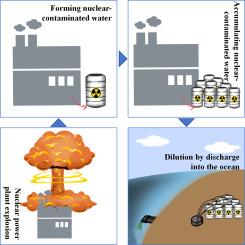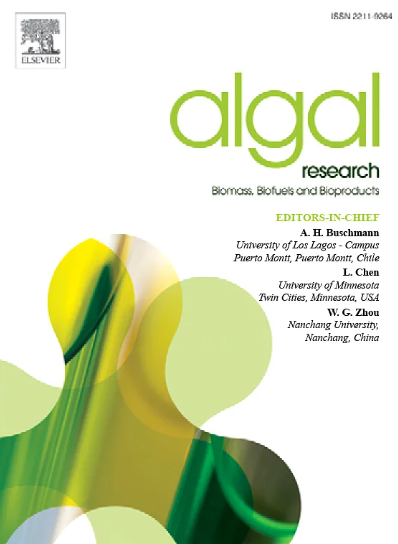Paying attention to the safety of global edible seaweeds after the discharge of nuclear-contaminated water from Japan
IF 4.6
2区 生物学
Q1 BIOTECHNOLOGY & APPLIED MICROBIOLOGY
Algal Research-Biomass Biofuels and Bioproducts
Pub Date : 2024-12-01
DOI:10.1016/j.algal.2024.103811
引用次数: 0
Abstract
Macroalgae play a crucial role as primary producers in the ecosystem. The increasing human demand for macroalgae has led to the development of the macroalgae aquaculture industry, which is seen as a potential solution to future food shortages. However, the Japanese Government's plan to discharge nuclear-contaminated water, which is projected to continue until at least 2053 with a total volume of at least 1.3 million metric tons, poses a significant threat to the macroalgae industry, ecosystems, and human health. Macroalgae can accumulate radionuclides from nuclear-contaminated water, which may then be transferred to other marine organisms or humans through the food chain or web, and the long-term implications of this ‘butterfly effect’ remain uncertain. In principle, international supervision and regulations should govern the management of nuclear waste, further filling the gaps in international law, including all aspects of addressing complaints and prohibiting the discharge of nuclear-contaminated water, to ensure responsible management based on scientific evidence. However, the current Japanese government's determination to proceed with the discharge of nuclear-contaminated water has revealed deficiencies in international legislation and a lack of enforcement power within international regulatory organizations, which demand further improvement. Herein, we call upon phycologists specializing in the utilization of macroalgal resources, marine organisms, and marine ecology to pay further attention to and conduct in-depth investigations into the potential long-term impacts of this event. Regardless, against the backdrop of Japan's ongoing discharge of nuclear-contaminated water, the commitment to advancing the health and stability of the global macroalgae industry and safeguarding the rights of seaweed farmers represents a lengthy but highly significant scientific endeavor.

日本核污染水排放后全球食用海藻安全性的关注
大型藻类是生态系统中重要的初级生产者。随着人类对大藻需求的不断增长,大藻养殖业得到了发展,这被视为解决未来粮食短缺的潜在办法。然而,日本政府排放受核污染的水的计划预计将至少持续到2053年,总量至少为130万公吨,这对大型藻类产业、生态系统和人类健康构成重大威胁。大型藻类可以从受核污染的水中积累放射性核素,然后这些放射性核素可能通过食物链或食物链转移给其他海洋生物或人类,这种“蝴蝶效应”的长期影响仍不确定。原则上,国际监督和条例应指导核废料的管理,进一步填补国际法的空白,包括处理投诉和禁止排放受核污染的水的所有方面,以确保基于科学证据的负责任管理。然而,当前日本政府执意推进核污染水排放,暴露了国际立法的不足和国际监管组织执行力的不足,需要进一步完善。在此,我们呼吁专门从事大型藻类资源利用、海洋生物和海洋生态学的生理学家进一步关注和深入调查这一事件的潜在长期影响。无论如何,在日本持续排放受核污染的水的背景下,致力于促进全球大型藻类产业的健康和稳定以及保护海藻养殖户的权利是一项漫长但意义重大的科学努力。
本文章由计算机程序翻译,如有差异,请以英文原文为准。
求助全文
约1分钟内获得全文
求助全文
来源期刊

Algal Research-Biomass Biofuels and Bioproducts
BIOTECHNOLOGY & APPLIED MICROBIOLOGY-
CiteScore
9.40
自引率
7.80%
发文量
332
期刊介绍:
Algal Research is an international phycology journal covering all areas of emerging technologies in algae biology, biomass production, cultivation, harvesting, extraction, bioproducts, biorefinery, engineering, and econometrics. Algae is defined to include cyanobacteria, microalgae, and protists and symbionts of interest in biotechnology. The journal publishes original research and reviews for the following scope: algal biology, including but not exclusive to: phylogeny, biodiversity, molecular traits, metabolic regulation, and genetic engineering, algal cultivation, e.g. phototrophic systems, heterotrophic systems, and mixotrophic systems, algal harvesting and extraction systems, biotechnology to convert algal biomass and components into biofuels and bioproducts, e.g., nutraceuticals, pharmaceuticals, animal feed, plastics, etc. algal products and their economic assessment
 求助内容:
求助内容: 应助结果提醒方式:
应助结果提醒方式:


